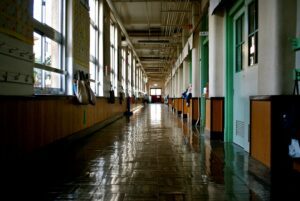Note: Sunshine Week was launched in 2005 by the then-American Society of Newspaper Editors. It is designed to draw attention to the perils of a secretive government and the critical importance of an open, transparent government. This year, Good Jobs First celebrates by highlighting places modeling great transparency around economic development incentives and corporate behavior.
In 2019, the School District of Philadelphia lost $112 million to tax abatements, more than any other school district in the nation. That was the same year that I graduated from a Philly public school that was severely underfunded — the impacts ranged from crumbling stairwells and overcrowded classrooms to a lack of air conditioning and using ancient materials.

But following the release of new data that exposed the price tag of corporate tax abatements, Philadelphia began to rein in some of its most costly programs – and put money back into schools.
While I was a student, there was more than one time that the ceiling collapsed; we were expected to walk around the debris. We used decades-old textbooks, went weeks with no toilet paper, suffered in hot classrooms, and knew our teachers were over-worked and under-paid.
According to an analysis done by The Conversation, seven public schools in Philadelphia have temporarily closed this school year due to asbestos contamination. Officials said it would cost the district $430 million to clean-up all environmental hazards. That money was not available, the district was told.
But by analyzing how much money the district loses to tax breaks, it became clear that this money could be available if the city stopped giving companies lucrative tax breaks that had skyrocketed in recent years. These losses, totaling $62 million in 2017, had grown to $112 million just two years later — an increase of more 81%. Public officials took notice of these trends and began to push to curb these expensive programs.
In December 2020, the Philadelphia City Council made moves to rein in these costly abatements and put money back into public services. Three bills went into effect at the start of 2022 (their implementation was delayed slightly due to the pandemic). These bills reduced the most costly of the city’s tax breaks, the Residential Tax Abatement and the Commercial & Industrial Tax Abatement, which had largely benefited wealthy developers in some of the city’s most thriving neighborhoods. Instead of paying zero property taxes for 10 years, they only get the 100% tax break in Year 1, following by a 90% tax break in Year 2, an 80% tax break in Year 3 and on, until they’re paying their full freight by Year 10.
Soon, Philly schools will hopefully use that new revenue to help students.
We were only able to see this data thanks to a new(ish) accounting rule. Governmental Accounting Standards Boards Statement No. 77 on Tax Abatements, enacted in 2017, requires most governing bodies in the U.S. – including school districts – to disclose how much revenue they lose to economic development tax abatement programs. This rule does not only apply to cities and counties, but passive losers like school districts and library districts, which rarely have a say in whether to give out corporate handouts but lose out on millions of dollars.
Fights like this, encouragingly, are not unique to Philadelphia. In New York, after a Good Jobs First study revealed that $1.8 billion of schools’ money was abated in 2021, legislators introduced a bill that would shield school funding from subsidy deals. There are also pushes in St. Louis, Kansas City, and Cincinnati to fully fund schools and curb these costly abatement programs.
Tax abatement transparency allows people to see just how much essential public services are losing, and push back against large corporate tax breaks. It’s the first step toward embarking on the type of meaningful reform Philadelphia leaders successfully executed.
If you are curious to see how this data works in your area, our database, Tax Break Tracker, compiles GASB 77 disclosures for the five most populous cities, counties, school districts per state, along with each state and our 50 state roadmaps. Don’t see your locality? Email me at [email protected] and I’ll see if I can help.
Read more
Sunshine Week: Transparency Portals Show It Can Be Done (more easily than you think)
Sunshine Week: Oregon EZ program lets you see into the future and into the past
Sunshine Week: Madison, Wisc. Offers A Shining Example of Transparent Economic Development
Sunshine Week: The Golden State (California) Gets a Gold Star